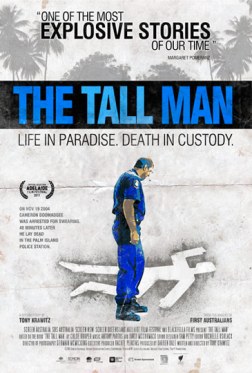
THE TALL MAN
Australia, 2011, 79 minutes, Colour.
Directed by Tony Krawitz.
Cameron Doomadgee was a tall man, an aboriginal man, from Palm Island. Arrested for drunkenness one night in 2004, he swore at the arresting officer and less than an hour later he was dead. The officer, Christopher Hurley, was also a tall man.
Aboriginal deaths in custody has been a serious issue for many years. This one raised headlines because the arrested man had not even reached his cell. What happened and who was responsible?
This documentary is based on a book by Chloe Hooper (who is interviewed in the film) who is critical of the police procedures and the trials and inquests.
However, director Tony Krawitz is sometimes at pains to present the many sides of the discussion. The aboriginal community of Palm Island, especially Cameron Doomadgee’s partner and sisters, are quite vocal about what happened and the way the courts dealt with the matters. A reporter for The Australian is quietly spoken but very convincing in his criticism of procedures and the credibility of the police and their reports. Lawyers also detail anomalies in proceedings.
On the other hand, there is testimony that Christopher Hurley was a good policeman and had served in many difficult communities with racial differences. But, there are also reports of his being charged with violent behaviour. One of the major difficulties is that Hurley changed details of his story and the reconstruction of what happened – a fall, with both men collapsing which does not correlate at all with the injuries Doomadgee suffered, especially breaks in his liver, facial injuries and other cuts and bruising. An aboriginal witness in custody claimed that Hurley beat the fallen Doomadgee in anger. Hurley declined to appear in the film.
Proceedings lasted years. Hurley was freed of all charges, especially manslaughter, but the Queensland government intervened and another hearing was held in 2009.
There are some powerful scenes of the police union meetings and a very gung ho support for Hurley who continues in police work at the time of the release of the film.
In only 80 minutes, the film shows us the episodes and the immediate explanations, the changes in testimony, the history of racial disputes on Palm Island and life there, especially riots after the death, the attitudes of the police and their union, raising many questions for Queenslanders and for all Australians.
1. The events portrayed in the film, the various perspectives, the probing of the mystery, the record of the events and the examinations and trials?
2. The title, the dead man, his life, reputation, the opinions of his partner? His drinking, swearing, the arrest? The interrogation – the suddenness of his death?
3. The title and the contrast between Cameron Doomadgee and Christopher Hurley? Both big men? Hurley and his reputation, the charges against him, testimonies in his favour, the interrogations, his friends and the investigations, the explanation of what had happened, police union support? The trials and inquiries? The aftermath and his continuing to work on the Gold Coast?
4. The success of the film as a documentary, as a record, the book the basis of the film, the interviews with the author, Chloe Hooper?
5. Palm Island, as a location, off the Queensland coast, from Townsville, its beauty? The Aboriginal settlement – and a place for difficult Aborigines in the early 20th century? The role of the police, law and order?
6. The situation with Doomadgee, the explanation, his drinking, the arrest, the forty-five minutes, his being hit, the story of the falls, the nature of Doomadgee’s injuries? The evidence? The post-mortem? The police and their plausible explanation?
7. Christopher Hurley in himself, his work, the witnesses from his previous posts, suggestions of racism, a tough policeman, the charges of his assault, the explanations?
8. The hearings over several years, in Townsville, the prejudice locally, the authorities? The black witness from the jail? The family, the disappointment with the results? The riots on Palm Island?
9. The eventual intervention of the government, its hesitation, the further hearings, the final exoneration?
10. The portrait of the Doomadgee family, Cameron’s partner, the long time together, her witness to his character, his sisters, the friends? As characters, their testimony? The aftermath?
11. The bonds within the police force, the unions, the vociferous meetings and votes, the stances?
12. The legal background, the lawyers on both sides and their comments?
13. The media, the television cameras and interviewers? The testimony of the journalist for The Australian and his rather more objective observations on what had happened?
14. The value of this kind of documentary, a record of what happened, the possibilities for review of a situation, the personal aspects for the people of Palm Island, the aftermath for Christopher Hurley at work – and his declining to be in the film?